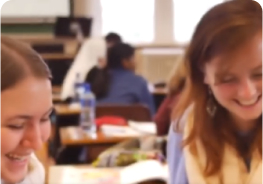40 Days
The Journey Through Lent
Home / The-journey-through-lent-1
40 Days
Since the date changes every year, Ash Wednesday creeps up unexpectedly on us. The date depends on the calculation of the date of Easter, which occurs on the first Sunday following the first full moon after the Spring equinox – March 21st. Counting back from Easter, there are 6 weeks and 4 days which give a total of 46 days. We normally think of Lent as a period of 40 days and that is correct. The catch is that the Sundays are not counted as every Sunday is a celebration of the Lord’s resurrection and therefore no fasting occurs on these days. No week passes by without a celebration of the resurrection.
Ash Wednesday is so named because of the traditional marking of the foreheads with ash to recall that we have come from dust and that we return to dust. We are from the earth, but we have all received the breath of life which makes us alive. We look forward to Easter where we look to the promise of life eternal for our earthly bodies through the death and resurrection of Jesus. The ash comes from the palm branches of the previous year’s Palm Sunday. The ashes are mixed with holy water and the paste is applied in a cross on our foreheads. From the beginning of Lent, we look forward to the Passion and Resurrection of Jesus and the gifts of new and transformed life that it promises.
The traditional Lenten practices prepare us to receive the gifts that the Risen Christ brings us at Easter. At every age, we need a new breath of life and a chance to make a new beginning. Lent is a time for recognising that we don’t always get it right. The Lenten practices are not designed to make us fitter, leaner, younger or richer. They are intended to mend the disordered relationships in our lives, with ourselves, with others, with our environment and with our God. The best-known practice is fasting. The aim is to find the right balance not only in food and drink but also in work, and today for many probably the right balance in mobile phone use. We too often overstimulate our minds and stuff ourselves with excess food or drink. Giving alms or charity is closely connected to fasting. Money saved is not set aside on a splurge fund for after Easter but is shared with those in need, helping us to make amends for how our greed may have hurt those around us. Lent is also a special time for prayer to give thanks to God for the daily gift of life and to be open to God’s healing touch in our lives. By praying and connecting with God we open ourselves to the great Easter gifts. Each of us has only so many opportunities to celebrate Easter in our lives. It is a shame to miss out on God’s offer of new and transformed life.
Lent at the Abbey
To help prepare for Lent, the monks of Glenstal Abbey have organised a series of talks which begins on Sunday March 10th. This year’s series is entitled Journeying with God’s People in Exodusand focuses on Exodus, an Old Testament book, which is often read by Christians in preparation for Easter. The talks take place each Sunday of Lent (apart from St Patrick’s Day) at 4.30 p.m. in the monastery library and will be streamed live on the Abbey website: www.glenstal.com, with recordings available afterwards. The talks will be followed by tea and coffee, and there is also the option of joining the monks for Vespers (Evening Prayer) at 6.00 p.m. in the Abbey Church. The talks are designed to prepare us to receive the gifts of new life that the Risen Christ brings at Easter.
The focus of last year’s series of talks was on the readings of the Easter Vigil. These talks have now been gathered together and recently published in The Glenstal Companion to the Easter Vigil, which is available at the Abbey Book Shop.

If you live outside Ireland, check out our dedicated area for international students.
Let’s talk
For Undergraduate queries: email admissions@spcm.ie.
For Postgraduate queries: email pgadmissions@spcm.ie.
For The Centre for Mission & Ministries queries, email: cmmadmissions@spcm.ie.
